Featured
Person:
February 13, 2010 - Dr Sylvester Nicol 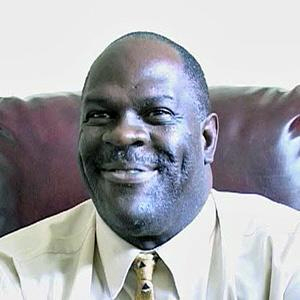
A Doctor Returns Home: Sylvester Nicol
Sierra Leone's health system has suffered from decades of corruption and the
destruction wrought by a long civil war. The few functioning hospitals are
under-staffed and short on medical supplies and equipment. Now a new medical
center provides high quality services all under one roof. In this edition of
Making a Difference we introduce you to Dr. Sylvester
Nicol.
Freetown, Sierra Leone's bustling capital city, sits on the slopes
of mountains that slide steeply into the Atlantic Ocean. During ten years of
civil war, Sierra Leone's institutions crumbled from widespread corruption and
the mass exodus of the country's professional class. None more so than the
health sector. Today a population of 6 million relies on the services of just 77
doctors.
Many Sierra Leoneans in the country's diaspora are now considering coming
back.
One of the few to make the leap is Dr. Sylvester Nicol. He moved
home in 2008 after living abroad for 14 years.
He left behind a
successful medical practice in the United States to establish a unique facility
in Freetown.
"The concept was to have as many services under one roof as
possible," Dr. Nicol explained. "This is a common concept elsewhere, but in
Freetown usually after you see a physician you might have to go elsewhere for a
lab test, then somewhere else to get an x-ray."
Dr. Nicol built and
manages the medical center which offers out-patient, laboratory and x-ray
services, a pharmacy and more sophisticated services such as ultrasounds and
specialized lab work. The center also has an intensive care ward. "What I love
about my job is the fact that people can get better and, if you do it well,
quickly. It is very very rewarding," he said.
Dr. Nicol believes that a
strong private sector is key to social development in his country. He believes
his medical practice will convince others in the diaspora to move back home and
rebuild their country.
"I think it is an incentive for people to come
back especially the middle class folks who are the ones who drive the economy.
They need and they are used to a certain type of healthcare," he
said.
Sukai Alghali moved back to Freetown from London two years ago. She
has trouble with high blood pressure but says the other health facilities in
Freetown are not up to standard. "The center is a God-send. I think for the
doctor to leave America to come here, you know, it must be - he must have the
love of the country," she said.
Although consultations cost only $15,
many Sierra Leoneans cannot afford the services at the medical center. But Dr.
Nicol treats everyone who comes his way and tries to balance his business
between those who can and those who cannot pay.
"In Africa you have to
have services for people who cannot pay the 50,000 leones [$15]. Just as a
medical person, you treat people who come through your door and you worry about
being paid later," Dr. Nicol said.
It's not easy to operate such a center
in Sierra Leone. Clinics here must cope with regular power cuts, a lack of
trained medical personnel and drug shortages.
"It was a huge challenge,"
Dr. Nicol stated. "But like any significant thing that you do, it has to be
challenging for it to be rewarding." Dr. Nicol has no regrets and no
plans to move back to the United
States. (courtesy: VOA news.com)
|
Featured
Person:
May 18, 2009 - Johnny Smythe, OBE
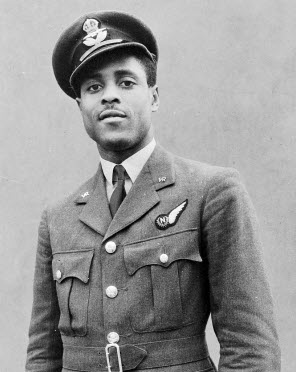
Pilot Officer John Henry Smythe (1915-1996)
John Henry Smythe was born in Sierra Leone. He served with the Sierra Leone
Defence Corps before volunteering for the RAF as a navigator. On the night of
18th November 1943 he was the navigator aboard a Short Stirling III heavy bomber
of No 623 Squadron, one of 395 aircraft dispatched to attack the German city of
Mannheim. The aircraft was crippled by anti-aircraft fire, and the crew was
forced to parachute from the stricken aircraft. They were captured and spent the
next 18 months in a prisoner of war camp. After the war Smythe stayed in the RAF
until 1951 and in 1978 he received an OBE. He died in 1996 in Thame,
Oxfordshire.
Johnny Smythe did not have to go to war.He was one of 55,000 people from Africa who volunteered to help Britain stop Hitler’s Germany. After Johnny’s plane was shot down over Germany, he spent 18 months in a Prisoner of War camp. He remembered what happened after the Russian Army liberated his camp. ‘They took me to a town near the camp and
I watched as they looted. A pretty German woman was crying because they had taken all her valuables. I wanted to help her but the Russians wouldn’t listen. I had hated the Germans and wanted to kill them all, but something changed inside me when I saw
her tears and the hopelessness on her face.’
Johnny was a Royal Air Force navigator who helped pilots flying planes like these Lancaster bombers stay on course during bombing raids. He was shot down over Germany on his 28th mission. Johnny volunteered to join the RAF because he hated Hitler for his racism. Jesse Owens won four gold medals at the 1936 Berlin Olympics but Hitler refused to shake his hand because he was African American. When he was captured, Johhny remembers; ‘The Germans couldn’t believe their eyes.
I’m sure that’s what saved me from being shot immediately. To see a black man – and an officer at that – was more than they could come to terms with. They just stood there gazing.’
Looking down on a Lancaster Bomber attack,Hamburg, 1943 ‘We were flying at 16,000 feet when the fighters came out of nowhere. They raked the fuselage and there were flames everywhere. Then the searchlights caught us. I was hit by shrapnel.
Pieces came from underneath, piercing my abdomen, going through my side. Another came through my seat and into my groin. I heard the pilot ordering us to bail out! We had some rough ones before but this seemed to be the end. I have tried to forget that night for 50 years.’ Stalag Luft I was a prisoner of war camp for almost 9,000 Allied airmen. Johnny helped other
prisoners try to escape but did not try to break out himself. He said, ‘I don’t think a six-foot-five black man would’ve got very far in Pomerania.’ Today there is a memorial at Stalag Luft I. In 2001, veterans and their families from America, Britain, Germany and Russia met at the camp in the spirit of reconciliation.
1915 Born in Freetown capitalof Sierra Leone.1940 Arrives in UK as RAF volunteer
1941 First mission 1943 On 28th mission over Germany, Smythe’s plane gets shot down
1943–1945 Stalag Luft I. POW camp. After the war, worked at Colonial Office
1948 travelled with Empire Windrush to bring 500 West Indian ex-servicemen and workers to UK
1950 Passed law exams; 1951 Married fiancée from Grenada. Sailed back to Freetown;
1961 Solicitor General of Sierra Leone. 1963 Lecture tour of the eastern United States
1978 Receives OBE –Order of the British Empire. 1993 Moved back to England
with his wife and 5 children; 1996 Died in Thame, Oxfordshire
(Courtesy Imperial War Museum)
Featured
Person:
May 4, 2009 - Elise Tan Roberts
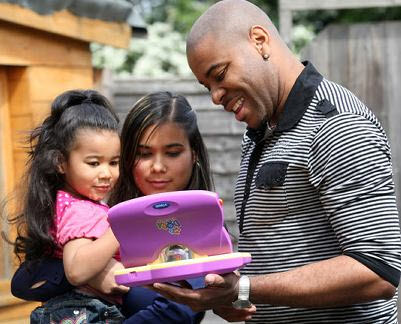
Upcoming: Elise Tan Roberts Is A Child Genius
Two-year-old Elise Tan is the youngest member to ever be
inducted into Mensa, a society for geniuses. With an IQ of 156, Elise Tan is an
exceptional child. Mensa normally tests children over ten years old but Elise
was made an exception based on a standardized test
Elise, who was born in London in December 2006 and has heritage in England,
Malaysia, China, Nigeria and Sierra Leone, uttered her first word at just five
months and took her first steps at eight-and-a-half months. Today Elise can name
35 capital cities, identify the three types of triangle, spell her name aloud,
read the words “Mommy” and “Daddy” and recite the alphabet.
Elise’s mom says she noticed her toddler’s intelligence early on.
“She just says things and you have no idea where she got it from. I don’t set
out to teach her loads of stuff, she just enjoys learning and picks things up.
She’s always on the go, she never stops.”
Elise’s father adds, “We don’t want to make her have to dumb down and stop
learning just to fit in. But she’s still my baby. I just want her to be happy
and enjoy herself.”
Although members of her family have included doctors and lawyers, none is a
member of the high IQ society.
Prof Freeman said the child’s memory was her great gift.
“I was extremely impressed she was able to reel off the capital cities of
about 20 countries and state, without hesitation, the phonetic alphabet.
“She has an exceptional memory which doubtless has been, and will continue to
be, the source of excellent learning and progress in the educational system.
“She is more than very bright and capable - she is gifted.”
Mensa has about 24,000 members in the UK and Ireland - about 900 of whom are
aged under 18.
As well as Carol Vorderman, whose IQ is 154, other famous members include Sir
Jimmy Savile, DJ and TV presenter and inventor Sir Clive Sinclair.
(Courtesy Times Online)
Featured
Person:
January
27, 2008 - Michaela DePrince

In
the Wings: Michaela DePrince
Most
ballerinas can trace their passion for dance back to a single early memory:
a love-at-first-sight moment inspired by music, pink tulle, or satin slippers—perhaps
in a theater, maybe in a dance studio. For Michaela DePrince, the introduction
to ballet was a remarkable coincidence in the midst of devastation. Just
twelve years old, Michaela has already made an extraordinary journey, replete
with tragedy, hope, interventions of fate, and sweat-earned triumph. One
wonders what could possibly happen next.
Michaela
was born in Sierra Leone, a country in West Africa that the United Nations
has declared to be the “least livable” nation in the world. Her parents
were killed in its civil war. Michaela was living in an orphanage
when she caught her first glimpse of a ballerina. A gust of wind blew a
European magazine to the gates of the building, and in it Michaela found
a portrait of a ballet dancer. She tore out the picture, and then
gave the rest of the magazine to other children. When an American
woman adopted her months later, Michaela spoke no English, but she showed
the woman the picture (which she had been wearing under her clothes all
along) and made it clear that this was what she wanted to do. Shortly
after coming to America, her new mother bought a DVD of the New York City
Ballet’s Nutcracker, fueling Michaela’s fascination with ballet.
Soon she took her first dance classes at the Rock School in Philadelphia.
From
the start, Michaela proved to be a natural, strong enough to begin pointework
at the early age of 7. Her mother bought Gaynor Mindens for her first pair
of pointe shoes, because she wanted to make sure Michaela would have an
“orthopedically sound shoe.” After briefly trying other pointe shoes,
Michaela “realized Gaynor Mindens were the best shoes for me,” and she’s
been loving them ever since. She also notes that she’s never had
a ballet injury, something she credits partly to the quality of her shoes.
After
starting pointe, Michaela shot through the levels at the Rock School and
also at former Pennsylvania Ballet principal Dalia Hay’s school in New
Jersey. By age 10, she was taking classes in the professional training
division—a program designed for high school students. Shortly afterwards,
Michaela and her family moved to Vermont, and soon found the New England
Ballet Conservatory. Michaela started taking private lessons with
Vanina Wilson, six days a week. She continued to study there dancing
4-5 hours a day, in addition to being a full time middle school student
(she totes her homework around with her to finish during her breaks).
Over the years, her busy schedule has also included tap, ballroom, salsa,
Graham and other modern techniques, yoga, and competitive swimming!
This
past summer, Michaela came to New York for the Dance Theater of Harlem
summer intensive, where she caught the eye of founding director and legendary
Balanchine dancer Arthur Mitchell. He even coached her privately
on the solos she was preparing for the Youth America Grand Prix, right
before the New York City finals. Michaela admits she was nervous
about working with him at first, but that the session improved her performance.
Michaela
continues to work with Mr. Mitchell and others at Dance Theater of Harlem,
commuting from Vermont when she has the opportunity. Her plans for
this year’s Youth America Grand Prix are ambitious: she is tackling Aurora’s
Rose Adagio variation from The Sleeping Beauty, as well as the Firebird’s
variation. Michaela chose these very different dances to highlight
her versatility. She’s aware that many audiences expect strength
but not delicacy from black dancers, and wants to challenge this assumption
with softness in Aurora’s variation. For the Firebird, Michaela is
working on sharpness and characterization. She is enjoying her research:
studying the way other dancers have transformed themselves into bird ballerinas.
Most
recently, Michaela has started rehearsing adult roles with Albany’s Berkshire
Ballet, and is very excited to start performing and touring with a professional
company. Looking to the future, Michaela says she wants to be a star.
She admires those black ballerinas who have made a mark, like the recently
retired Houston Ballet principal Lauren Anderson, and Endalyn Taylor of
DTH and the film Center Stage. Michaela lists an assortment of classical
and contemporary dance companies she would like to dance with in the future,
from San Francisco Ballet to Dwight Rhoden’s Complexions. Mainly,
though, Michaela emphasizes that she wants to show that “black people like
me can become famous, too… things can happen.”
By
Mary Hodges
(Courtesy
Gaynor Miden Online Newsletter. Photo of Michaela by Danny Weiss. Courtesy
of New England Ballet Conservatory.)
Featured
Person:
September
22, 2007 - Dr. Christiana Thorpe
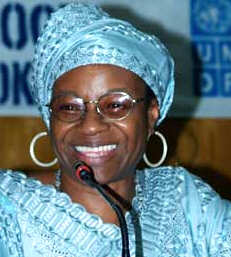
Dr. Christiana
Thorpe: An Appreciation
For
over a month now, during which time Sierra Leone successfully conducted
its most historically significant national elections after its decade-long
brutal civil war, the individual who represented the face and vision of
the country during the entire electioneering process is the Chairperson
of the National Electoral Commission (NEC), Dr. Christiana Thorpe.
Throughout
the process, she exuded confidence, assurance, decisiveness and purpose
to guide a country on electoral tenterhooks emanating primarily, but not
wholly, from tribal, ethnic, regional and ideological affiliations to its
first transparent elections. Her sparkling, if not infectious, smile was
disarming, ebullient, exuberant, with a touch of willed innocence, but
at the same time stern, firm and pragmatic.
In
her daily press briefings, either to report the progressive tally of the
election results or to provide other NEC-related information, she rarely
referred to herself or the deliberations of NEC in the first person singular
pronoun; rather, she mostly spoke as "we," a language choice that was deliberate
as its was inclusive; perhaps it reveals her style of leadership, her view
of democracy, and her vision of the nation. Speaking as "we" obviously
discards the egotistic ("I") voice, the hallmark of political rhetoric,
positing instead a vision of leadership that acknowledges a communal ethos.
In doing so, she was also saying that the elections were not about individuals
but about the nation. She, therefore, was speaking on behalf of all Sierra
Leoneans.
When
President Kabbah, in his television address on September 12, admonished
Sierra Leoneans to remain calm as the votes from the presidential run-off
elections of September 8 were being counted, he did so by also reassuring
us that NEC "Officials were trustworthy", and that he had "confidence in
the integrity of that body." Perhaps the person who captured that trustworthiness
and integrity the most is Dr. Thorpe whose unpretentiousness and conscientiousness
galvanized the nation and captivated the attention of international observers.
She demonstrated a reassuring calm in the midst of a contentious election;
she provided neutrality amid the deep ideological divide of party politics;
she remained coherent in her interpretation and communication of murky
election laws and procedures; she was dutifully aggressive in her defense
of the people's right to free and fair elections and the place of the laws
to guarantee just that.
She
took her job with an enormous sense of responsibility and accountability,
and brought into it a profound respect for the rule of law and the culture
of trust and honesty. She emerged from the process a powerful administrator
and a vibrant leader who used the levers of government for its own good
and for the service of the people. By so doing, she has transformed our
election system, radically altering it from a rig-prone apparatus to a
model of accountability and transparency. We just have to wait and see
if this will take root in our democracy.
Not
surprisingly, praises for Dr. Thorpe, from Sierra Leoneans who were looking
for tamper- and violence-free elections, and International observes who
witnessed and monitored and subsequently affirmed a free, fair, and peaceful
election carried out with integrity and transparency, have been superlative,
and deservedly so. She made the country proud; she provided a different
script from the normal narratives about elections in Africa. For Sierra
Leoneans in the country, and for those in the Diaspora as well, her conduct
of the elections provides a ray of hopeful light in a country that for
many, many years now has made peace with darkness. How we capitalize on
this ray of hopeful light now that the elections are over lies mainly in
the hands of the new administration.
But
what Dr. Thorpe symbolized during this pivotal moment in our national journey
towards democratization is something deeper and profound -a craving and
yearning for: a leadership that is dispassionate, patriotic and compassionate;
a sense of national direction that is as forward-looking as it is goals-oriented;
a commitment to the rule of law and the principles of justice that are
executed impartially; a frankness that is direct but at the same time purposefully
tolerant and patient; an avowed devotion to the policies rather than the
politics of our election laws and practices; a defensive but modestly overwhelming
desire to make our democracy work in the interest of the people. She did
not allow the rancorous and divisive politics within the country, or the
dissents or disagreements within NEC, to sway and divert her from the huge
national responsibilities that were on her shoulders. In fact her will
and action to maintain the independence of NEC remained unflagging; she
did not underestimate any complaint or challenge of electoral malpractice
and shenanigans, real or imagined. Most important of all, she did mot succumb
to the temptations of bribery and corruption. In all this, Dr. Thorpe torpedoed
a political culture that valorized and perpetuated corruption as the shameful
benchmark of our national identity.
In
doing so, she managed with panache the fears and anxieties, panic and paranoia,
doubts and obsessions, mistrusts and suspicions, dreams and visions, aspirations
and wishes, and hesitations and determinations of Sierra Leoneans. She,
therefore, became the projection screen for our multiple wishes, wishful
thinking, and fantasies.
She
also emerged as a faithful and dependable leader, and defender, of the
people's right. That is, she never wavered in her commitment to the ethos
and practice of democracy to cater to the supreme and sacrosanct will of
the people. And nothing speaks more to this fact than this point in her
final statement: "The people of Sierra Leone deserve to exercise their
rights in an atmosphere of freedom, fairness and transparency. This is
what NEC strived to provide and will continue to strive for in the future-nothing
less will be tolerated." Say what you may about her; have your reservations
and cynicisms about her because of your politics; however, the one fundamental
and memorable thing she achieved was to make the will and voice of the
people speak. Dr. Thorpe's assertion about the peoples' right to freedom,
fairness, and transparency should not be limited to elections only; rather
her observation signals what we must expect from our governments, including
the newly elected one.
Dr.
Thorpe will remain an iconic figure in our discourse on, and practice of,
democracy in Sierra Leone. Representing far more than a face or a chair
to an election process, she symbolizes the possibilities of what women
in Sierra Leone can and will do if given the space and wherewithal to contribute
to our national development. Dr. Thorpe performed her job as Chairperson
of NEC not because she is a woman, but because she is a Sierra Leonean
committed to a functional democracy. However, the fact that she is a woman
should not be ancillary to the way we judge the tremendous work she has
done for the country. Gender is a sub (or core) text in how we evaluate
her.
As
a matter of fact, her gender should be foregrounded for the reasons that
she has demonstrated what women can do when given the opportunity; she
has also pointed to, albeit indirectly, the serious gender problems we
have in Sierra Leone where, on the whole, women have limited opportunities.
Gender imbalances are still evident in: (a) the way we value the education
of boys over girls; (b) the patriarchal and traditional mores that shortchange
and stifle the capabilities and potential of women and (c) our lackadaisical
and anemic approach to institute, and practice, laws that promote gender
equity. Dr. Thorpe has exemplified the necessity of making available more
opportunities for women in meaningful leadership roles. Her performance
is an emphatic entry into that domain of male preserve of decision-making.
Her decisiveness in accomplishing this national obligation marks a symbolic
ceremony of arrival for Sierra Leonean women. We now must translate the
symbol to the actual ceremony of empowering our women by creating leadership
opportunities and spaces they can comfortably and legitimately occupy.
But
Dr. Christiana Thorpe represents for Sierra Leoneans something else, a
metaphor of sorts; her performance as chief of NEC is a metaphor of the
type of leadership we want: a pragmatic and productive leadership that
takes the country out of its paralyzing doldrums. Her firmness, discipline,
dedication, fairness, decisiveness, result-orientedness, dispassionateness,
honesty, tolerance and patience are leadership qualities we need, more
than ever, at this particular moment in our history. These qualities will
transform for the better this country that is allergic to its own possibilities
and potential. But above all, her very subtle lesson that a leader should
speak and act as "we" provides a leadership model that is progressive,
inclusive, consensus-driven, and reassuringly fresh.
By
Patrick Bernard,Lancaster, PA,USA.
Featured
Person:
September
10, 2006 - Clarence Roy-Macaulay
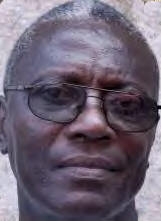
Clarence Roy-Macaulay
: Receives Associated Press (ap) Gramling Spirit Award
Four
months after President Ahmed Tejan Kabbah nominated and appointed Veteran
Journalist Clarence Roy-Macaulay to be an "Officer of the Order of the
Rokel" in recognition of his "exemplary dedication and contribution to
the Nation in the Field of Journalism", according to the National Award
citation, news came in from the headquarters of the Associated Press (AP)
in New York, U.S.A.on Monday August 28, 2006 from the President of the
AP International News Agency (founded in 1848) Tom Curley that Mr. Roy-Macaulay
has won this year's AP Oscar - GRAMLING SPIRIT AWARD.
According
to the citation the prestigious AP International Award is in recognition
of Clarence Roy-Macaulay's "dedication to the AP Mission, exceptional and
enthusiastic service to all AP staff members, subscribers and/or clients."
The recommendation letter accompanying the nomination for "excellence and
distinguished service " from the AP West Africa Bureau Chief in Dakar,
Senegal, Todd Pitman to the panel of judges who sat together at AP headquarters
in New York, USA in July, 2006, to read through the submitted samples of
the nominees work and letters and pick the winners, stated "AP always know
they are well covered and represented in Sierra Leone and will get the
news story before our competitors.
That
is not an easy task and Clarence Roy-Macaulay has always come through."
The President of Associated Press News Agency Mr. Tom Curley has invited
Mr. Roy-Macaulay to New York for the Award Winning Dinner Ceremony on October
25, 2006.
Clarence
Roy-Macaulay was recruited from London in 1966 after he obtained his professional
Diploma in Journalism from the Polytechnic School of Journalism at Regent
Street, London in July, 1965 and appointed substantive News Editor, acting
as Editor of the Government owned Sierra Leone Daily Mail.
He
became the first Public Relations & Students Placement Officer when
Njala University College was established as one of the constituent colleges
of the University of Sierra Leone.
He
joined the Government Information Service (GIS) on May 19, 1969 as Information
Officer and was posted to Bonn, West Germany in August, 1969, as the first
Press and Information Attaché in the newly established Embassy of
Sierra Leone, covering the then five European Common Market countries,
France, Italy, The Netherlands, Belgium and Luxembourg.
When
Sierra Leone became a Republic on April 19, 1971, he was recalled home
in October, 1971, to assume the office of first Press Officer in the Office
of the President.
He
later served as Press and Information Attaché in Sierra Leone's
Embassy in Moscow.
At
the GIS then down at Wallace Johnson Street, Clarence Roy-Macaulay served
as Head of the News Room which was responsible for production of the daily
news bulletin broadcast by the Sierra Leone Broadcasting Service (SLBS).
He
rose through the ranks to become Controller of News & Current Affairs,
SLBS, Ministry of Information & Broadcasting, and voluntarily retired
on pension from Government Service in April, 1989.
From
January, 1981 to early 1982, he assumed "overall control and supervision"
of the budding Sierra Leone News Agency Division in the Ministry of Information
& Broadcasting On retirement he contributed to the NEW CITIZEN newspaper
then at Hannah Benka-Coker Street, as a Senior Correspondent specialising
in reporting Parliamentary debates and other important national events.
He was also a contributor to the former UNITY NOW newspaper.
When
UNOMSIL was established in 1997 under the Special Representative of the
UN Secretary General Ambassador Francis Okello, Mr. Roy-Macaulay became
the first Public Relations Officer of the UN Civilian Mission.
He
has been a Writer for the Associated Press for several years, covering
the rebel war in Liberia from Monrovia for the Associated Press for a period,
and the ten-year rebel war in Sierra Leone, sensitizing the international
community about the armed civilian conflict in Sierra Leone until peace
was finally achieved.
(Concord
Times, Freetown)
Featured
Person:
June
11, 2006 - Osman Sankoh

Osman Sankoh:
Appointed Deputy Executive Director INDEPTH (International
Network of field sites with continuous Demographic Evaluation of Populations
and Their Health in developing countries).
Dr.
Osman Sankoh will now continue his work at the INDEPTH Network Secretariat
in Accra as the Network’s Deputy Executive Director after his promotion
to the position on 1st June 2006.
INDEPTH
Network currently consists of 37 demographic surveillance system (DSS)
sites which continuously evaluate populations and their health at the household
level in 19 countries in Africa, Asia, Central America and Oceania.
Professor
Fred Binka, Executive Director of INDEPTH, said that appointing Dr. Sankoh
was a confirmation of the confidence he and the Board have in Dr. Sankoh
and a recognition of Dr. Sankoh's invaluable contribution to the successful
development of the Network over the last four years. "Osman is hardworking.
He is full of initiatives; a great and dependable team member," said Professor
Binka.
"Having
worked as unofficial deputy for several years with Fred Binka, a name associated
internationally with good work, unflinching commitment to purpose and a
strong will to deliver excellent products from a South-based organisation,
I feel greatly humbled by this appointment and do accept the position with
humility, as I am aware of the great challenge it brings along," said Dr.
Sankoh. "I will continue to work effectively in our small team to provide
the requisite support to the Executive Director and to the other important
organs of the Network - the Board, the Scientific Advisory Committee, our
revered Site Leaders and their great teams."
"Osman’s
appointment as Deputy Executive Director is timely and well-deserved” said
Professor Stephen Tollman of the School of Public Health at the University
of the Witwatersrand in Johannesburg, South Africa, Chair of the INDEPTH
Board of Trustees. "The Board is particularly pleased to endorse this appointment,
and we keenly look forward to building on our already tried and tested
relationship with Osman. He will, I know, lead with distinction as INDEPTH
works to realize its great potential.”
Osman
became the Communications and External Relations Manager of the INDEPTH
Network in mid 2002 following the formal constitution of INDEPTH in February
that year. Before that, he was a consultant to INDEPTH and worked closely
with the Boston Consulting Group to develop the first INDEPTH Strategic
Plan 2002-2004. Dr. Sankoh was the lead editor of the Network's first major
publication which achieved exceptional publicity and international attention
to INDEPTH - Population and Health in Developing Countries, published by
IDRC, Canada in 2002.
Arnond
Mishkin of Mishkins Associates in New York who was a Vice President of
the Boston Consulting Group said: “Osman Sankoh has been one of the leaders
in the initial success of INDEPTH. His promotion is both a tribute to him
and his work personally as well as a testimony to how INDEPTH has become
a permanent institution that will provide invaluable information to public
heath and medical authorities for the future.”
"I
am delighted by Osman’s appointment and have no doubt that his competencies
will contribute to taking the network to new heights. I wish him and his
team the best as they enter a new phase in INDEPTH’s development and look
forward to continued collaboration," commented Dr. Cheikh Mbacke, a former
Vice President of the Rockefeller Foundation which was among the few funding
agencies that took the risk to provide the first core funding to INDEPTH.
Dr.
Nguyen T. K. Chuc, site leader of the Filabavi DSS site in Vietnam - a
founding INDEPTH member site - expressed delight about Dr. Sankoh's appointment
and said she was strongly convinced that he would use his demonstrated
competence to continue to make INDEPTH stronger.
Osman
was born in 1962 in the little village of Warima in Northern Sierra Leone.
He attended the Njala University College (now Njala University), University
of Sierra Leone where he graduated in 1987 with a First Class Bachelor
degree in mathematics with distinctions in both teaching practice and education
project. He was awarded the University of Sierra Leone Prize for Academic
Excellence. After service to his country as a Research/Teaching Assistant
in the Department of Mathematics at Njala University, he pursued further
studies in Applied Statistics at the University of Dortmund in Germany
where in 1996 - during his doctoral programme - he was awarded the German
Academic Exchange Service (DAAD) Prize for Academic Excellence and Exceptional
Social Engagements by a Foreign Student; a prize which cut across all nationalities.
At the University of Dortmund he worked as a research assistant in the
Chair of Statistical Methods in Genetics and Ecology in the Department
of Statistics and also in the Institute for Economic and Social Statistics.
Dr
Sankoh is by training a biostatistician, epidemiologist, environmental
researcher, and an excellent communicator. His research covers statistical
methods in environmental and ecological research; demographic surveillance
systems in the developing world; environmental impact assessment and management;
and geographical information systems.
Osman
worked for three years as a scientist in the Department of Tropical Hygiene
and Public Health at the University of Heidelberg Medical School in Germany.
During that time, he collaborated with the Nouna Health Research Centre
in Burkina Faso and spent several research periods in Nouna. He has also
acted as a consultant on population and health issues to the World Bank,
the World Health Organisation, and the University of Pennsylvania in the
US.
Osman’s
publications have appeared in a range of international journals. His work
on epidemiology and biostatistics has been published in Tropical Medicine
and International Health and the International Journal of Epidemiology.
Papers on environmental impact assessment and management that he has authored
or co-authored have appeared in the African Journal of Environmental Assessment
and Management, the Journal of Environmental Management, and Environmental
Impact Assessment Review. His work on creative writing includes Hybrid
Eyes - An African in Europe and Beautiful Colours both of which he first
wrote and published in German.
(Courtesy
INDEPTH website)
Featured
Person:
May
16, 2006 - Sarian Bouma
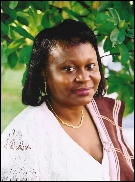
Sarian Bouma:
Spotlighted Again
Welfare
to Millionaire author is honored as one of Maryland s Top 100
(Landover,
MD (March 2006)
Sarian
Bouma, the CEO of Capitol Hill Building Maintenance, Inc., was selected
as one of Maryland s Top 100 women for 2006. Chosen from more than 400
nominations, Ms. Bouma was honored for demonstrating excellence in her
professional career as an entrepreneur, volunteer, and mentor.
Sarian
Bouma has been a successful business woman in Maryland for more than 18
years. Ms. Bouma, who was born in Sierra Leone, West Africa, from humble
beginnings is now the CEO of a multimillion-dollar firm. But her success
did not come without hurdles or obstacles. Faced with few opportunities
and no funds, she had to live at a women s homeless shelter with her son,
under the welfare system. Determined to escape the system, Mrs. Bouma dedicated
herself to learning through the training programs it offered. After years
of a progressively successful banking career, she went on to start her
own business. Despite numerous challenges along the way, all of her efforts
paid off. Today, Mrs. Bouma is an award-winning public figure and self-made
millionaire whose story has been told in O magazine and numerous other
media outlets. Her compelling life story has been captured in her autobiography,
Welfare to Millionaire: Heart of a Winner , with U.S. Senator Bob Dole
and former Maryland Governor Parris Glendening each contributing a foreword.
The
criteria for selection to Maryland s Top 100 Women were based not only
on excellent professional experience, but also for demonstrating sincere
dedication to volunteerism and mentorship. (To learn more about this program,
please visit www.top100women.com.) Mrs. Bouma uses her success to make
a difference in the lives of others. She has given a significant amount
of money to charities, especially organizations such as the House of Ruth
and Providence Health Foundation, which helped her in her time of need.
When her native Sierra Leone was experiencing a gruesome civil war, Mrs.
Bouma adopted two children who were victims of the war. Mrs. Bouma is an
advocate for mentorship: She hires employees from diverse backgrounds;
she has encouraged employees who were once homeless to purchase homes;
fostered employees who were high school dropouts to pursue a college education;
and trained employees who were former welfare recipients to be top managers
in her corporation. In addition, she also steps out on a limb and hires
young aspiring entrepreneurs to handle many of her critical business needs.
Sarian
Bouma posses the heart of winner, she has come up from the bottom to become
one of Maryland Top 100 Women. In the process, she has pulled others up
with her, as she prepares the younger generation to be ready when she passes
the baton.
About
the Author
Mrs.
Bouma is the CEO of Capitol Hill Building Maintenance, Inc., a multimillion-dollar
corporation serving government and corporate clients primarily in the Washington,
DC, Metropolitan Area. She is married, with six children.
BOOK.
Welfare To Millionaire: Heart of a Winner
by
Sarian Bouma
Featured
Person:
February
18, 2006 - Miatta Dabo
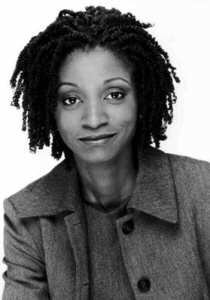
Miatta Dabo:
An act to watch
Miatta
Dabo is on top of her game and a woman to watch. She may not think
so but she is a rising star. Miatta is an attorney (commercial litigator)
with one of the top 100 law firms in Baltimore Maryland. She is also a
certified public accountant, has a Masters in International Finance, is
a writer, a mentor, a human rights activist (with Amnesty International,
Children International, Plan International to name a few); she travels
around the country educating judges on the atrocities of war, especially
in her native land of Sierra Leone West Africa. She also plans to
pursue a PH.D in human rights law and one-day serve as ambassador for her
beloved Sa Lone. She has recently added entrepreneur and jewelry designing
to her list as she has just opened up her Boutique MIX. At 30, Miatta
is just starting out in accomplishing her big dreams.
In
December 2005, she was listed as one of the top 20 singles in Baltimore
magazine. She also worked as a runway fashion model at the Autumn 2003
New York fashion week as one of the models. 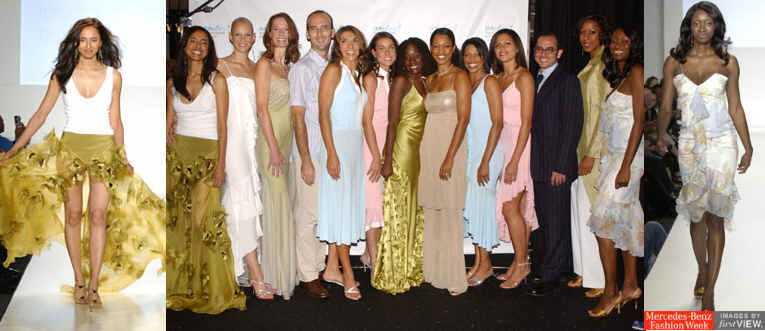
To
those who know her, she is the phenomenal AFRICAN woman; smart, savvy,
sophisticated, and stylish. She believes that very soon she'll have her
own empire. Her quiet and resilient determination has been an inspiration
to her family, friends, and colleagues.
Most
young women would love to read her story. She is a mentor and tutor to
young people and always works hard for causes she believes in. She
is an inspiration and a role model. Miatta is an example of a strong smart
intelligent young woman who doesn't let life’s obstacles hold her down.
(By
Khadie)
Featured
Person:
January
14, 2006 - Kandeh Yumkella
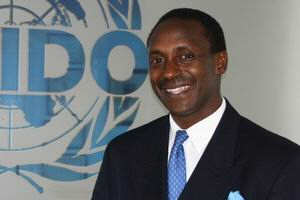
Kandeh Yumkella:
Confirmed as Director-General of UNIDO for Four Years
The
11th session of the UNIDO General Conference took place in Vienna from
Monday, 28 November to Friday, 2 December 2005, confirming Mr. Kandeh Yumkella
as Director-General of UNIDO. The four-year term of the new Director-General
formally began on 8 December. The acceptance speech of Director-General
Yumkella is available here for viewing or downloading.
Mr.
Yumkella became the candidate for Director-General after his landslide
victory in the election conducted by Industrial Development Board in June
2005. He is the first African to hold this position since UNIDO became
a specialized agency in 1985. A national of Sierra Leone, he holds a Ph.D.
in Agricultural Economics from the University of Illinois. Subsequently
he occupied several academic and research positions in the United States
and in 1994 was appointed Minister for Trade, Industry and State Enterprises
of Sierra Leone. He joined UNIDO in 1996 as a Special Advisor to Director-General
Mauricio Maria y Campos. Later he took up the post of Director of the Africa
and Least Developed Countries Regional Bureau. In 2000 he was appointed
as UNIDO Representative and Director of the Organization’s first Regional
Industrial Development Centre in Nigeria, a position he held until 2003
when he became Senior Advisor to the outgoing Director-General, Carlos
Magariños.
The
General Conference was opened by Federal President of Austria, Mr. Heinz
Fischer. In his opening remarks, President Fischer welcomed the presence
of Prime Minister of Haiti, Mr. Gerard Latortue and Prime Minister of Tanzania,
Mr. Frederick T. Sumaye. Prime Minister Sumaye is one of UNIDO's Goodwill
Ambassadors. During the Conference, Enrique V. Iglesias, Ibero-American
Secretary General, and former President of the Inter-American Development
Bank, was designated Honorary Goodwill Ambassador of UNIDO in recognition
of his achievements in international development.
According
to the protocol of such occasions, the confirmation of the new Director-General
took place at the closing ceremony (on December 2). President of the Republic
of Rwanda and Vice-President of the African Union, Mr. Paul Kagame, and
Sierra Leone's Minister of Trade and Industry, Kadi Sesay, were among the
high-level participants who congratulated Director-General Yumkella. President
Kagame pledged the region’s full support for Director-General Yumkella.
The Conference also paid tribute to outgoing Director-General, Carlos Magariños,
adopting a resolution in which the notable achievements of his eight years
in office were recognized.
Other
decisions and resolutions of the General Conference included a strategic
long-term vision statement; the medium-term programme framework 2006-2009;
the programme and budgets for the biennium 2006-2007; and the implementation
of the Cooperation Agreement with the United Nations Development Programme.
The Conference decided to extend the current appointment of Mr. Shauket
Fakie, the Auditor General of South Africa as the External Auditor of UNIDO
for a period of two years. The General Conference also elected representatives
to the Industrial Development Board and the Programme and Budget Committee.
All documentation relating to the 11th session of the UNIDO General Conference
is at www.unido.org/gc11.
The
plenary session of the Conference included an Industrial Development Forum
entitled: Industrial development, trade and poverty alleviation through
South-South Cooperation. A number of related interactive "side events"
also took place, on the following topics: Promotion of trade through industrial
capacity-building; Cooperation in technology transfer; Trade-capacity building
- The UNIDO-WTO joint programme and joint pilot projects and the Cotton
Initiative, Productivity in developing countries: Trends and policies;
Trade-capacity building - the UEMOA experience; Activities in the field
of Multilateral Environmental Agreements; and Business Partnership Programme
- A joint FICCI, DIPP and UNIDO project in India.
Discuss
Yumkella's acceptance speech
(By
Jeannine Orlowski, UNIDO)
Featured
Person:
January
4, 2006 - Monty Jones
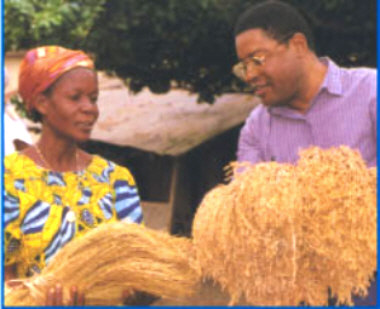
Monty Jones:
World Food Prize Laureate
Born in Sierra Leone, Monty
Jones began his career in 1975 with the West Africa Rice Development Agency
(WARDA) in its Mangrove Swamp Rice Research Project in Rokupr in his home
country. WARDA is one of the 16 international research centers sponsored
by the Consultative Group on International Agricultural Research (CGIAR)
of the World Bank.
Following a variety of assignments,
in 1991 Dr. Jones was appointed Head of the Upland Rice Breeding Program
at WARDA, then located in Côte d’Ivoire. It was in this position
that he made his exceptional breakthrough achievement in combining Asian
and African rice varieties to develop a new rice, uniquely suited to poor
African rice farmers.
Working closely with colleagues
at WARDA and the CGIAR system, through sheer personal tenacity, Monty Jones
succeeded where all others before him had failed. He discovered the genetic
process by which a “New Rice for Africa” (NERICA) could be created, producing
plants with higher yields, shorter growing cycles, and more protein than
either of its parents.
With the ability to resist
weeds, survive droughts and thrive on poor soils gained from its African
parent, and the trait of higher productivity from its Asian ancestor, NERICA
is a crop capable of increasing farmers’ harvests by up to 50 percent.
This work has led to the
rapid development of more than 3000 NERICA lines. Dr. Jones and WARDA,
under the leadership of its Director General Kanayo F. Nwanze, have worked
on multiple levels to ensure the widest possible use of this new improved
rice. Using gender sensitive approaches, they have brought together farmers,
scientists, extension workers, NGOs, and governments to create a “community
based seed system” whereby local farmers can choose which NERICA variety
best fits with their local needs. As demonstrated in the pilot projects
undertaken in Benin, Côte d’Ivoire, Gambia, Guinea, Mali, Nigeria,
and Togo, NERICA has the potential to benefit 20 million rice farmers (many
of whom are women) and 240 million consumers in West Africa alone. NERICA
also has the potential to spread throughout Africa and to other parts of
the world.
The Minister of Agriculture
and Rural Development of Nigeria, Mallam Adamu Bello, praised Dr. Jones
for the development of drought tolerant, pest resistant, high protein NERICA.
He noted NERICA’s high acceptance by Nigerian farmers, which has resulted
in a 30 percent expansion of upland rice cultivation in the sub-humid Guinea
Savanna Zone of the country.
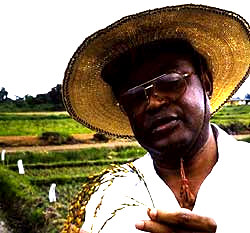
“Dr. Jones’s achievement
in overcoming sterility barriers and the successful introgression of adaptation
and tolerance genes from African rices into the high-yielding rices of
Asia will have a major impact on rice production not only in Africa, but
also in Asia and Latin America,” said CGIAR official Emil Q. Javier.
Dr. Jones and WARDA’s efforts
in developing and spreading this new agricultural technology is all the
more remarkable in that it has taken place during a politically volatile
period, with work being done and significant progress being made in some
countries afflicted with violence, such as Guinea, whose rice imports were
reduced 50 percent in just several years as a result of the adoption of
NERICA.
“In many ways, Monty Jones’s
vision and tireless efforts represent a model for future generations of
African scientists,” commented Gordon Conway, President of the Rockefeller
Foundation, in a letter of support. “His ability to combine cutting edge
science with on-farm work have yielded significant benefits for the many
poor rice farmers in Africa that were by-passed by the Green Revolution.”
Dr. Jones is a graduate of
the University of Sierra Leone and received both his M.Sc. in Plant Genetic
Resources (1979) and his Ph.D. in Plant Biology (1983) from the University
of Birmingham in the United Kingdom. In 2002, he was appointed the Executive
Secretary of the Forum for Agricultural Research in Africa (FARA), based
in Ghana.
Courtesy: The World Food
Prize Foundation
666 Grand Ave / Suite
1700 / Des Moines, Iowa 50309 USA
Featured
Person:
January
3, 2006 - Mohamed Kallon

Many happy
returns to Asia for Kallon
An
AFC Champions League winner’s medal for tournament top scorer Mohamed Kallon
ensured it was a happy return to Asia for the Al Ittihad striker who is
playing for a club in the continent for the first time since leaving Lebanon’s
Al Tadamon for Inter Milan in 1996.
“It’s
nice to come back to Asia and since I arrived here I have tried to perform
well and it is really nice to be the top scorer of the competition,” Kallon
told FootballAsia.com after helping Al Ittihad to a 4-2 victory over Al
Ain on Saturday, which saw the Jeddah giants keep hold of their AFC Champions
League title with a 5-3 aggregate win.
“However,
the most important thing for me is that we won the title and we are still
the Asian champions.”
The
Sierra Leone international, who owns a club in his homeland called FC Kallon,
opened the scoring less than three minutes into the second leg with a sweetly
struck free-kick, his sixth goal in as many matches.
Although
it was teammates Mohammed Noor, Joseph Desire Job and Ahmed Dokhi that
added to the Al Ittihad tally, the fact that Al Ain’s Subait Khater, the
only other player left with a realistic chance of finishing the tournament’s
ACL top scorer, failed to add to his five ACL goals meant that Kallon’s
goal was enough to see him emerge as the master marksman.
“Scoring
the goal was very good for me especially that it was the first goal for
the team in the match and it helped us a lot,” remarked Kallon, who scored
both goals in Al Ittihad’s semi-final second leg defeat of Busan I’Park
four days before he celebrated his 26th birthday.
“I
thank all my teammates for their support and it (being the top scorer)
wouldn’t have been possible without them. I want to thank also all the
Ittihad fans for their excellent support for me and for the whole team.
“It
was a very tough game but we won the cup and we are all very happy. I’ll
never forget what happened today because this is the first time for me
to win an Asian championship and it was great to play in the AFC Champions
League.”
Kallon
signed for the six-time Saudi champions at the end of July on-loan from
French outfit Monaco.
After
first coming to prominence playing for Al Tadamon in Lebanon, Kallon moved
to Inter Milan in 1996 although he couldn’t command a regular first team
place and was loaned out to Bologna, Genoa, Calgiari, Reggina and Vicenza
before returning to Inter in the 2001/02 season.
Kallon
stayed with the Nerazzurri until July 2004 when he joined Monaco and scored
11 times 27 games before returning to the Middle East and the chance to
shine on the AFC Champions League stage and now, thanks to Al Ittihad’s
victory the FIFA Club World Championship, which takes place in Japan in
December.
“It
has been a great time for me here especially with the AFC Champions League
and winning it was so important for me personally because we’ll play in
the FIFA World Club championship.
“Playing
at such a level is something new for me because the whole competition is
new. I never played there before and that makes a big difference for me.”
By
Nick McCormack and Mohammed Hallal; AFC Champions League, Nov 6, 2005
Featured
Person:
Dec
31, 2005 - B.J.Tucker
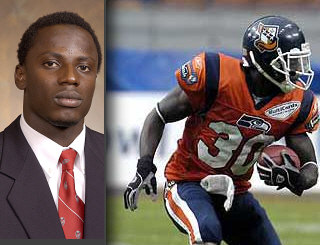
B. J. Tucker:
Native of Sierra Leone finds place in 49ers' secondary
For
much of this year, injuries have left the San Francisco 49ers searching
high and low for players in their secondary.
So
it is somehow fitting that as the 49ers prepare to wrap up the season,
they have in their secondary a player whose far-flung saga makes the stories
of the other off-the-street pickups sound mundane by comparison.
Born
in Sierra Leone, B.J. Tucker was sent by his parents at age 10 to live
in Seattle with an aunt and uncle as that West African nation and former
British Colony fell into a decade-long civil war fought in part by children,
at an ultimate cost of an estimated 50,000 lives.
In
the United States, Tucker switched from soccer to football. He eventually
played cornerback at Wisconsin, was drafted by Dallas in the sixth round
in 2003, and bounced around the NFL without appearing in a game until early
this season, when he was signed to the 49ers' practice squad.
Sunday
afternoon, when the host 49ers (3-12) complete their season against the
Houston Texans (2-13), the 25-year-old Tucker will play in his sixth NFL
game. He might even make his first start.
"My
situation has been pretty fortunate," said Tucker, who is in the United
States as a permanent resident.
Tucker's
parents, who are divorced, follow his career from afar and are not exactly
hard-core football fans. His father, a chemistry professor, moved to Milwaukee
in 1997. Tucker's mother, Joan Scott, lives in war-torn Liberia, near Sierra
Leone, where she works for the United Nations assisting refugees.
"It's
always a concern, but we speak weekly or every two weeks, so I know that
she's safe," Tucker said of his mother, who he has seen only once since
he left Sierra Leone in 1991.
While
Tucker was moving to the United States, war broke out in Sierra Leone.
"I
was young," said Tucker, whose given name is Baigeh Joe. "I didn't know
anything about it."
His
first exposure to football came playing in the backyard with his cousins.
But he shied away from the sport for a while because he was small, and
at 5-foot-10, 188 pounds, he has hardly developed into a the stereotypical
NFL behemoth.
Tucker
received his most extensive playing time to date during last week's victory
at St. Louis, as the result of injuries to cornerbacks Derrick Johnson
and Bruce Thornton. He was burned for a 40-yard touchdown by Torry Holt,
but otherwise performed solidly.
Johnson
and Thornton are expected to miss Sunday's game, which means more work
for Tucker. Early this week, coach Mike Nolan said Tucker would start.
Friday, though, Nolan said the start might go to Mike Adams, with Tucker
coming in on passing downs.
Though
Tucker would like to start, the opportunity simply to play in the NFL after
two years trying to find a foothold is satisfying in its own right.
"It's
just exciting to play," Tucker said. "I'm just glad they gave me a shot
to go out there on the field, whether it be special teams or on defense."
By
Roger Phillips
Featured
Person:
Nov
23, 2005 - Isha Sesay

Isha Sesay:
Broadcasting 'Princess' Comes to CNN
Isha Sesay joined the team
of CNN International anchors based at the network’s global headquarters
in Atlanta in November 2005, from the UK broadcaster ITN where she anchored
ITV1’s ‘Early Morning News’ programme; as well as for the UK’s most-watched
breakfast programme, ‘GMTV’.
Isha spent much of her childhood
in Sierra Leone after moving there when she was seven.
She returned to England at
16 to study for her A-levels and had dreams of going to drama school to
become an actress. However, after pressure from her mother and teachers,
she agreed to go to university, where she studied English at Trinity College,
Cambridge.
After completing her degree
Isha worked as a researcher on Kilroy before moving to Glasgow to work
on some shows for BBC Scotland.
Following a spell working
in radio Isha got her break as a presenter and presented a variety of programmes
for the BBC, CNN, and TWI before joining Sky in March 2002.
After four months working
with the production team, learning to edit, write scripts and voice packages,
Isha moved in front of the camera and is now a regular presenter.
To date the high points of
Isha's career have been interviewing Ellen McArthur and travelling from
Bolton to London with Arsene Wenger and members of the Arsenal team after
a match at the Reebok Stadium for Kanu's heart foundation.
Isha remains true to her
childhood dreams and still has ambitions to star in a Hollywood movie and,
of course, to pick up a best actress Oscar!
Isha's Working
day at Sky
Could you introduce yourself
and what you do here at Sky?
My name is Isha Sesay and
I am a morning presenter on "Good Morning Sports Fans" for Sky Sports News.
What is a normal working
day like for you?
A normal working day starts
at around half three when I wake up. I leave my house at about four o'clock
and I am at work at about ten past four. My first job is then to go through
the morning newspapers to see what is making the back pages and to see
what our big stories will be.
I have a chat with the production
team to have a sense of where we are going with our show that morning.
There will be loads of stories in the papers but we choose our lead. You
have to know what is happening and what you need to be prepared for, what
stories may unfold during the day.
Once all that is done I have
to go through the script that the production team have been working on
for about an hour before I get in. They get in really, really early. Then
it is off to make up at about five o'clock. Then I rush back into the studio
and take my position on set and then we go live to the nation at 6 o'clock.
All news presenters articulate
in a certain way, how do you learn that?
I have never had voice training,
it is just the way I speak. Every news presenter here and news presenters
in general have their own speech pattern and their own intonation. I think
it is just more a reflection of your personality than something that you
can inherently learn from other people.
How does one get a job like
yours?
Sky Sports News run screen
tests every six weeks looking for presenters - any budding presenters out
there with an interest in sport. All you have to do is write in and send
a tape of yourself and if they feel that you have got something that you
are interested in whatever that may be, it might not be the biggest sports
knowledge, it may be your look or your manner or your personality, and
you will get called in for a screen test. That is what happened with me.
I came in for one of those random screen tests and it went from there.
How much do you have to know
about sports?
I think it is a balance.
We have people here who are incredibly knowledgeable about sports. In my
case, I am very knowledgeable about football and I have an interest in
all other sports but it is more about the passion. You have to be passionate
about sports. If you don't know everything that there is to know about
sports right now that shouldn't put you off. If you are passionate, as
long as you can get that across, that is what we are looking for here at
Sky Sports News.
Where do you see yourself
in the future?
That is always a difficult
question, where to go next, because I am very happy at Sky Sports News.
Doing the breakfast show is great because we are live all the time, that
buzz is incredible. You are reacting to different stories, you are reacting
to everything that is happening around you and it will be hard to get that
feeling elsewhere so I haven't really thought about it. For now I am really
happy here.
What kind of training did
you do?
To get in to television as
a whole I went to university and read English literature and after university
I wrote off to lots of production companies asking for work experience.
I got work experience at Kilroy, the morning chat show, and I worked there
for ten months. From there I worked behind the scenes in television for
about two and a half years before I got my first break in TV. I was asked
by someone if I was interested in trying out for the role of a roving reporter
on a show. It wasn't the case of who I knew, I was just lucky and I had
been working hard and making it known that it was something that I wanted
to do.
What is the best thing about
your job?
Doing live television is
fantastic, it is hard to beat that thrill. We also get to meet so many
interesting people. I met Michael Watson the boxer a couple of weeks ago,
and that was incredible. It was a life changing moment to me, someone with
such grace and who has been through so much. Meeting such a variety of
people and working on live TV, that is a huge plus.
And the worst aspects..?
Getting up at half three
in the morning. I have been doing this now for about a year and a half
and it doesn't get any better. I still groan in the morning.
What makes you good at your
job?
I'd like to think that my
passion and my dedication to my job is what makes me good. I work very
hard at it and I make sure that I keep on top of what is happening around
me. I think you need that, you need to be hard working and passionate and
I think that the viewers will pick up on that. You have to have a sense
of fun, you have to enjoy what you are doing. I think that the viewers
respond to that.
What is the most valuable
advice that you have been given?
The most valuable piece of
advice that I have ever been given was by the head of Sky Sports, my top
boss, he said: be prepared or be prepared to fail. It is very simple and
that is a motto that Alex Ferguson, the manager of Manchester United has.
It has served me very well.
What is a nightmare scenario
that can happen on live TV?
Nightmare situation is when
you are turning to camera to start reading the story and the autocue goes
down and you have a hard copy of your script but it is in the wrong place.
The story that you are supposed to be doing isn't even there and you are
grappling to find your place and to somehow act calm when in fact all pandemonium
is breaking loose around you.
What is auto cue and how
do you use it?
Auto cue carries our script
and we have a camera that we look at and the words that we are saying are
scrolling up the screen. That is how we sound so articulate and poised,
it is all on the screen. We try to read it without making our eyes roll
too much.
Adapted from RFTF.Sky.com
Featured
Person:
Nov
18, 2005 - Sarian Bouma
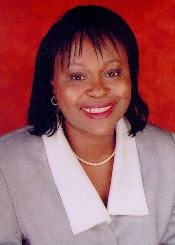
Sarian Bouma:
Award winning business woman
Twenty-five
years ago, Sarian Bouma arrived in the United States to create a better
life for her family in Sierra Leone. But after a year of marriage, she
found herself divorced, pregnant and out on her own. She found solace in
a woman's shelter and went on welfare so that she could feed her son. However,
she never allowed her status as a recent immigrant and unemployed single
parent keep her from accomplishing her personal goals. After working at
a variety of odd jobs, she landed a position as a bank loan officer in
Washington, D.C.
During
this time, she was encouraged by her customers and future husband to start
her own business. After attending a series of seminars on business ownership,
Bouma decided to become the owner of a franchise commercial cleaning firm.
She was attracted to the opportunity because it didn't require much start-up
capital and she would be able to build clientele quickly.
"If
you have a big name, they [contractors] feel that you can deliver," says
Bouma. She named her business ServiceMaster of Capitol Hill Inc., as a
reminder of the place in Washington where she one day wanted to do business.
Over the next five years, she proved her capability as an entrepreneur,
procuring lucrative custodial contracts with government and commercial
agencies.
In
1993, she decided to become an independent contractor and established Capitol
Hill Building Maintenance Inc. in Lexington Park, Maryland, with the help
of the Small Business Administration and a $25,000 loan from the Maryland
Small Business Development Financing Authority. Providing full-service
janitorial services to offices, warehouses and medical suites in the metro
Washington, D.C., and Norfolk, Virginia, areas, Capitol Hill Building Maintenance
has 13 clients and grossed $3.4 million last year. It is also recognized
as one of the fastest-growing small janitorial firms in the Washington,
D.C., area.
Despite
her success in business--Bouma has contracts with such federal agencies
as the Department of Navy, has won awards and grossed millions of dollars--she
feels that her greatest accomplishment has been helping the 200 people
she employs. Besides giving them jobs, she has instilled in them the desire
for an education, home ownership and entrepreneurship.
"I
am in the battlefield and I cannot lose," says Bouma. "I must fulfill the
needs of my customers and my employees."
By
Femi Lewis, Black Enterprise
Featured
Person:
Oct 24, 2005 - Mamusu
Thoronka
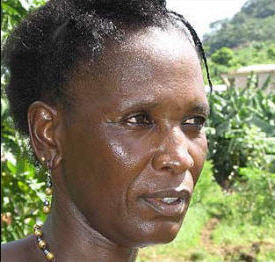
Mamusu Thoronka
(Lest we forget their misery)
During Sierra Leone's decade-long
civil war, rebels developed the horrific tactic of chopping off the hands
or legs of civilians as a way of sowing terror in the population. Mamusu
Thoronka, 41, was one of the many thousands of people affected.
Four years after the end
of the war, she explains how she is trying to support her family, without
any help from the government.
Mercy
The rebels cut off my hand
on 22 January 1999 in the capital, Freetown. I heard the rebels were coming
and tried to hide in a building but they caught me. They put my left hand
on a table and chopped it off with a machete. I begged for mercy and asked
them to think of God. They told me to point to God with my right hand and
they tried to chop that off, too. They tried three times but could not
cut it off. But I cannot use three fingers on my right hand.
Agony
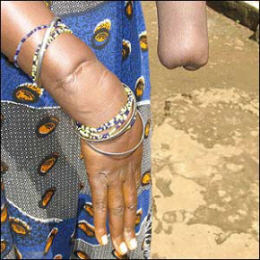 The
rebels said I should get another hand from [President Ahmad Tejan] Kabbah.
They said he had lots of spare hands. I was in agony - I thought I would
die. I went to hospital but all the doctors had run away. The
rebels said I should get another hand from [President Ahmad Tejan] Kabbah.
They said he had lots of spare hands. I was in agony - I thought I would
die. I went to hospital but all the doctors had run away.
The city was full of corpses.
My left hand was hanging on by the skin and started to rot. After a week,
I saw a doctor, who treated my wounds.
School fees
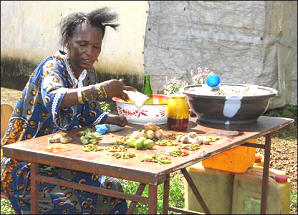
Since then, my husband has
grown distant from me - I am sure he has taken another wife without telling
me.
I think he's worried about
what our six children would say to him. I try to support the children by
buying goods such as this palm oil in the countryside and selling it in
Freetown. But I cannot afford all of their school fees - already the two
oldest have dropped out because their fees are too expensive.
Rebel threats
I also keep a few chickens.
We normally eat them ourselves but we sell them if we need money quickly.
Once, one of the rebels
came to our village near Freetown and said he would finish us off.
They say they will kill
us amputees because if the government no longer sees us, they will stop
talking about the rebel atrocities.
If that provocation does
not stop, I am worried there could be another war.
Cross-border trade
As well as palm oil, I also
sell vegetables and beans. With that money, I buy things such as clothes,
salt and household goods which are more expensive up-country than in Freetown.
It is difficult to carry all these goods, so I ask other people to help
me.
I would like to go to Guinea,
where some goods are cheaper than here. Maybe the customs officials would
take pity on me and not charge me too much duty.
Children's future
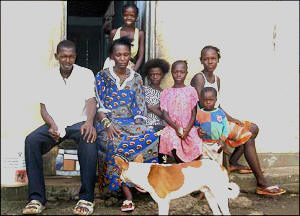
I am not too interested
in punishing those who cut my hand off but I want my children to be taken
care of.
The former rebel fighters
are being well looked after, with skills training and free education for
their children.
The Sierra Leone Truth and
Reconciliation Commission said we amputees should get a pension but we
have seen nothing, although a Norwegian charity built this house for me
and my family.
Discrimination
I cannot cook on my own
any more, so I have to get one of the children to help me, while I tell
them what to do.
This is my daughter, Bonki.
Sometimes when my children get into an argument at school, people say to
them: "Your mother is a half-person." It is really upsetting. We amputees
are really discriminated against in Sierra Leone.
Anniversary
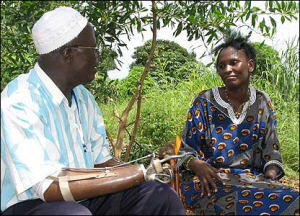
Every 22 January, I get
sad when I remember the attack, until friends come round to take my mind
off it.
I work with the War Affected
Amputees Association - this is the group's president, Lamin Jusu-Jarka,
who had both his hands chopped off. He had his artificial limbs fitted
in the US. Sometimes, I travel with him around the country meeting other
amputees and trying to campaign for our rights.
Interview and photos by
Joseph Winter (adapted from news.bbc.co.uk)
Featured
Person:
Oct 22, 2005 - Delia
Jarrett-Macauley
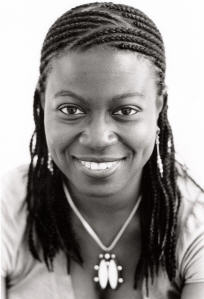
Delia Jarrett-Macauley
(DMS, Ph.D., FRSA)
Is
an acomplished writer, academic and broadcaster with a career spanning
over 20 years. Her impressive body of work is held in high regard both
nationally and internationally.
Delia
has published three books, the most recent being Moses, Citizen and Me,
which is her first novel.
Academia
A multi-disciplinary
scholar in history, literature and cultural politics, Delia has devised,
taught and examined a range of courses at the Universities of Kent, London
and Middlesex. Delia began her university teaching career in 1989 by running
the first black women’s studies courses on the MA in Women’s Studies at
the University of Kent; she later published an anthology based on that
programme of work. She also devised and led the Arts Management Programme
at Birkbeck College, London.
Delia
has trained teachers at Goldsmith’s College, London and has contributed
to many professional development courses for teachers and facilitators
in Europe at a range of academic institutions, including the Amsterdam
Summer University and (in association with the European Cultural Foundation)
the King Baudouin Foundation (Brussels) and the European Network of Cultural
Administration Training Centres.
Delia
has contributed to a number of academic publications as author and board
member including Feminist Review, Women’s History Review, Journal of Gender
Studies and Gender and History.
Broadcasting
Delia
has worked on a number of broadcasting projects for BBC Radio, including
devising and presenting 'The Una Marson Story' and 'Black Women Writers
in 1930s England' on Radio 3 and 4 respectively. She has also contributed
to Woman’s Hour and Open Book on Radio 4, the Radio 3 website on Ideas
and Culture and the 2004 BBC Music Live Festival. Delia voiced 'Warrior
Marks', Alice Walker's documentary film on female circumcision shown on
UK television.
BBC
Radio 4 has commissioned Delia to present 'Sierra Leone: My imaginary homeland'
in 2006.
Consultancy
Since
the mid-1980s, Delia has worked extensively in the cultural sector, including
a period as Director of the Independent Theatre Council, and later as a
consultant to Arts Council England. She also managed the pan-African dance
summer school and co-ordinated educational projects for African Players.
In the 1990s she was joint director of the National Theatre’s project,
Transmission, which focused on arts and social change in Europe.
Delia
has more than twenty years experience of leading change management projects
across all sectors, providing guidance for senior managers and human resource
specialists. Her diverse client list includes Sainsbury’s Supermarkets,
Shell (UK), NSPCC and local government agencies.
Award for Sierra
Leone war novel
A novel about a child soldier
in Sierra Leone has won the prestigious Orwell prize for political writing.
Delia Jarrett-Macauley,
a British writer whose parents are from Sierra Leone, was honoured for
her novel, Moses, Citizen and Me.
It is the first novel to
win the award since the award started 16 years ago.
Ms Jarrett-Macauley wrote
the book after hearing a report about a boy soldier who had been recruited
to kill his grandparents during the civil war.
She said she wanted to focus
on the emotional ways in which the child soldiers respond to their situation.
One of the judges, Bernard
Crick, said the book was appealing because of the way it dealt with the
most extreme political problems of violence in a very balanced and humane
way.
Some 50,000 people were
killed and many more maimed and raped in the decade-long civil war which
ended in 2002.
The conflict was marked
by the frequent hacking off of limbs, ears and lips of civilians.
Story from BBC NEWS:
http://news.bbc.co.uk/go/pr/fr/-/2/hi/africa/4879400.stm
Featured
Person:
Sept 27, 2005 - Rev
Eugene Wellington
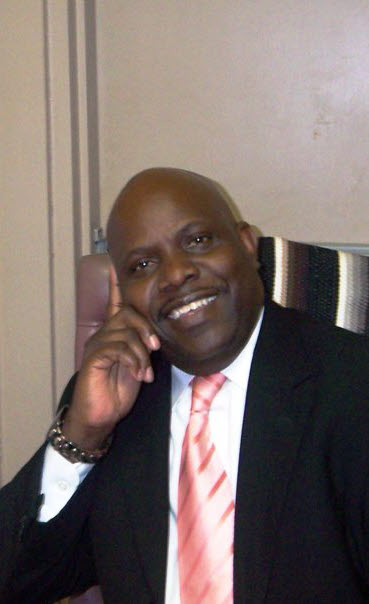 Food
Bank Before Hurricane Food
Bank Before Hurricane

Rev
Eugene Wellington
Executive Director
Director Community Christian Concern Slidell, Louisiana
In the wake of hurricane
Katrina, someone inquired in one of the Sierra Leonean online discussion
forums whether anyone knew of any Sierra Leonean victim of that phenomenal
disaster. Rev Eugene Wellington a Sierra Leonean who now calls Louisiana
his new home would most certainly not want me to focus on the complete
destruction of their home and property. He just wants to get on with the
task of caring for vagrants and the homeless, the work his agency has been
occupied with since its inception in 1983. Community Christian Concern
(CCC) served over 5000 families in the Slidell area last year. Food, clothing,
personal items, and Christian counseling were just a few of the services
provided to these families. Eugene is supported by a volunteer staff
and a volunteer board of directors.
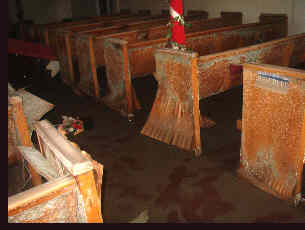 Speaking
to me from Slidell where the trauma of the damage assessment has only been
compounded by the wrath of hurricane Rita; In Rev Wellington's own words
he exclaims:"Everything in that office was lost. Our church with a congregation
of about 100 took ten feet of water. It is a total loss. None
of the buildings had flood insurance, because it has never been necessary
before. Our home owners insurance nor our commercial insurance will
cover the loss. 80% of our congregation members lost their homes and their
jobs. We trust that God is more than able to help us re-build, but
for now we could use the help of friends and, churches and organizations.
Staff members including myself have lost our incomes or homes or both.
Food and clothing have been made available by Red Cross and other FEMA
agencies. The greatest needs right now are financial to help us keep
at the least a skeleton staff, to help purchase appliances like stoves,
freezers, refrigerators, washers, dryers, furniture, etc." Speaking
to me from Slidell where the trauma of the damage assessment has only been
compounded by the wrath of hurricane Rita; In Rev Wellington's own words
he exclaims:"Everything in that office was lost. Our church with a congregation
of about 100 took ten feet of water. It is a total loss. None
of the buildings had flood insurance, because it has never been necessary
before. Our home owners insurance nor our commercial insurance will
cover the loss. 80% of our congregation members lost their homes and their
jobs. We trust that God is more than able to help us re-build, but
for now we could use the help of friends and, churches and organizations.
Staff members including myself have lost our incomes or homes or both.
Food and clothing have been made available by Red Cross and other FEMA
agencies. The greatest needs right now are financial to help us keep
at the least a skeleton staff, to help purchase appliances like stoves,
freezers, refrigerators, washers, dryers, furniture, etc."
You are encouraged to seize
this opportunity in making a donation in cash or kind to help the Wellington
Family quickly return to a position of capacity, to continue to provide
for the homeless and destitute of Louisiana who are now in double jeopardy.
For me, Eugene and family have helped me put a face and personal
point of contact to this sad American tragedy. I have no doubt that this
will also be true with many of you.
You may send your gifts directly
to the Wellingtons. Both his church TEAM (The El-Bethel Apostolic Tabernacle)
and CCC (Community Christian Concern) are 501c and therefore any contribution
made will be tax deductible. The particulars are:
The El-Bethel Apostolic
Ministry
P.O.Box 3104
Slidell, LA 70459
Tel: 985-639-0446, 985-781-8326,
985-960-2169 cell
Bank: JPM Chase
Gause Blvd.
Slidell, LA 70458
Act. # 626239648
All checks can be made out
to TEAM with a designation e.g. The Wellington Family, A Church Family,
The Church, or CCC.
Eugene can be reached at:
EWellington458@aol.com
Compiled by Crispin R. Cole
Sept 27, 2005
Featured Person:
Community leader Mary Musa,
Chairperson of Koidu Town Council.
Photo:
Laura Lartigue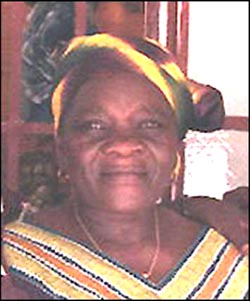
Female Chairperson challenges
male-dominated region and
rebuilds after the war
We were taught that although
we must take care of our personal needs, as a leader one should always
be concerned about the needs of the people we lead and not be completely
self-centered."
After the civil war in Sierra
Leone was over, Mary Musa returned from exile to Koidu Town in Kono District.
She had nowhere to sleep because her house had been burned. She also received
devastating news – her husband had been killed during the war.
Returning to her town under
great hardship and becoming a leader in the community had unique challenges.
Now serving as Chairperson for the Koidu Town Council, Musa is a rarity
– a woman in a position of power in the male-dominated mining region of
Kono. Says Musa, "It wasn't easy to become the Chairperson. This position
had never been handled by a woman in this district so there were complaints
that I should be replaced by a man. Thank God that people stood strong
to maintain me.”
Musa needed training in her
new role as chairperson. She wanted to help the community cope with the
losses resulting from the war and support them as they rebuild. USAID-sponsored
Nation Building training provided Musa and other leaders in the community
with knowledge about leadership, public service, accountability, acceptance,
and teamwork.
As the former head teacher
of a local school, upon her return to Koidu, she used the classrooms to
shelter herself and her five children, along with ten other children whose
parents were killed during the war. She was able to mobilize her fellow
teachers to make bricks to put up a small housing unit so that the children
could move out of the classrooms.
"After the training," says
Musa, "I found out that staying discouraged about my situation wouldn't
help – I needed to do something practical about it. We were able to engage
our school children, along with our relatives, in helping us. They molded
each brick for fifty cents. The lesson that dealt with looking into the
needs of other people in the community helped me a great deal.”
When asked why she decided
to take the training, Mary Musa said, "Because I am a leader. When we came
back after the war, we had so many problems. We leaders are also under
much stress. Undergoing this training has helped me tremendously in carrying
out my activities.”
Although she has a rough
road ahead as people in Koidu learn to transition back into a peaceful
society, the USAID training has allowed her to use her abilities and her
patience in solving difficult situations around her for both herself and
for other members of the community. "I have now discovered that through
my own potential, I can do much to assist my children, myself, and my community."
(Culled from USAID website)
Sep.12, 2005
SC
Featured Person:
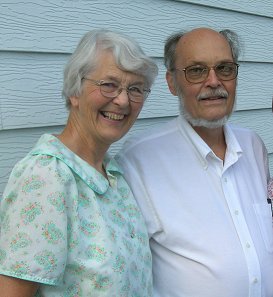 Rev
Dr. Donald Kinde Rev
Dr. Donald Kinde
Former Wesleyan Missionary to Sierra
Leone - A personal impact
Rev. Donald Kinde, affectionately
called Don, and I met after my return from studies in Australia in 1988.
When I saw this tough imposing person I was a little bit intimidated. It
didn't take me very long to discover that Don was a gentle giant. My acquaintance
with him was warranted by me being appointed Assistant National Superintendent
of the Wesleyan Church of Sierra Leon. Don was the Missions Director, we
both lived in the same city Makeni, in the North of the country.
Don is the man who plays
by the rules. He was wearing many hats. Senior Pastor Rogbane Church, in
Makeni, Director of Missions, Chairman Advanced training committee. The
list goes on. How he accomplished all those full time assignments is still
a puzzle to me. Suffice it to say that he was not lacking in his accomplishments.
He was always thorough and precise.
Don played by the rules.
He was time conscious. He delivered whatever he promised. My first encounter
with him was on the day of the dedication of the conference center. As
the coordinator of the event, I had gone to his church to get benches and
chairs. As a former Pastor of the church myself, I knew how to get things
done in the church and so I went to the custodian and asked him to open
the church and collected the benches and chairs. When I met Don at the
center, he asked me whether I was aware that thieves broke into the church
and stole some benches and chairs? I was wondering what he meant until
it dawned on me that he was alluding to me who took the benches without
his permission. He was mad and I was mad. At the end of the ceremony we
convened a meeting at the center for the next day. At that meeting we spoke
frankly to each other and committed ourselves to communicate and respect
each other in the future. Since that time Don and I became close colleagues
and friends.
As District Superintendent
of the Makeni district, I benefited from the assistance of Don in numerous
areas. He asked for help from America to renovate some of our churches,
he advanced me loan when I was embarking on an agricultural development
for my pastors. Don was always willing to assist. He was liberal in giving
to a fault. He gave even what he didn't have. That was the extent of the
love and generosity of this man.
Don was a community man who
spoke Krio fluently. He interacted not only with Christians in Makeni but
also people of other faiths and denominations. He was respected and revered
in the community and his influence extended not only in Makeni but the
entire Bombali District as well as Freetown.
Don is a systematic homiletician.
His message was concise and redemptive. A consummate missiologist, Don
articulated missions strategies with compassion and professionalism. As
an academic who was President of the Jui Bible College, Don was not only
an erudite scholar but a missionary who contextualized his ministry to
suit whatever group or community he worked in. He was a prolific writer
that delivered volumes of useful texts from his pen.
Indeed, I interacted with
many Missionaries during my tenure with the churches in Sierra Leone, but
Donald Kinde stands out eminently as one of the most dedicated, considerate
and resourceful missionary that labored in my native land. Time will not
erode his contributions to the development of the Wesleyan Church in Sierra
Leone and the ecumenical community that he served with integrity and distinction.
It is because of his distinctive
qualities and services that the Wesleyan church of North America recommended
to the University of Indianapolis, that the degree of Doctor of Divinity
(Honoris Causa) be conferred upon him. "Seest thou a man diligent in his
business, he shall stand before Kings and not mean men".
Rev Don kinde is married
to Joan Kinde, who is also an accomplished missionary in Sierra Leone.
They have three children, Mark, Larry and Carrie Jo. They spent a total
of sixteen years in Sierra Leone. Don and Joan are retiring in Minneapolis.
Written by Rev. Silas Nicol
Former Assistant Superintendent
of The Wesleyan Church of Sierra Leone
We
will continue presenting "Featured Person" biographies here, celebrating
the lives of those we know and love. Please send in your ideas and nominations.
We are looking to feature people of notoriety to Sierra Leoneans.
Click
here to go to the "Contact Us" page where you can send in nominations for
this purpose.
|


















 The
rebels said I should get another hand from [President Ahmad Tejan] Kabbah.
They said he had lots of spare hands. I was in agony - I thought I would
die. I went to hospital but all the doctors had run away.
The
rebels said I should get another hand from [President Ahmad Tejan] Kabbah.
They said he had lots of spare hands. I was in agony - I thought I would
die. I went to hospital but all the doctors had run away.




 Food
Bank Before Hurricane
Food
Bank Before Hurricane

 Speaking
to me from Slidell where the trauma of the damage assessment has only been
compounded by the wrath of hurricane Rita; In Rev Wellington's own words
he exclaims:"Everything in that office was lost. Our church with a congregation
of about 100 took ten feet of water. It is a total loss. None
of the buildings had flood insurance, because it has never been necessary
before. Our home owners insurance nor our commercial insurance will
cover the loss. 80% of our congregation members lost their homes and their
jobs. We trust that God is more than able to help us re-build, but
for now we could use the help of friends and, churches and organizations.
Staff members including myself have lost our incomes or homes or both.
Food and clothing have been made available by Red Cross and other FEMA
agencies. The greatest needs right now are financial to help us keep
at the least a skeleton staff, to help purchase appliances like stoves,
freezers, refrigerators, washers, dryers, furniture, etc."
Speaking
to me from Slidell where the trauma of the damage assessment has only been
compounded by the wrath of hurricane Rita; In Rev Wellington's own words
he exclaims:"Everything in that office was lost. Our church with a congregation
of about 100 took ten feet of water. It is a total loss. None
of the buildings had flood insurance, because it has never been necessary
before. Our home owners insurance nor our commercial insurance will
cover the loss. 80% of our congregation members lost their homes and their
jobs. We trust that God is more than able to help us re-build, but
for now we could use the help of friends and, churches and organizations.
Staff members including myself have lost our incomes or homes or both.
Food and clothing have been made available by Red Cross and other FEMA
agencies. The greatest needs right now are financial to help us keep
at the least a skeleton staff, to help purchase appliances like stoves,
freezers, refrigerators, washers, dryers, furniture, etc."



